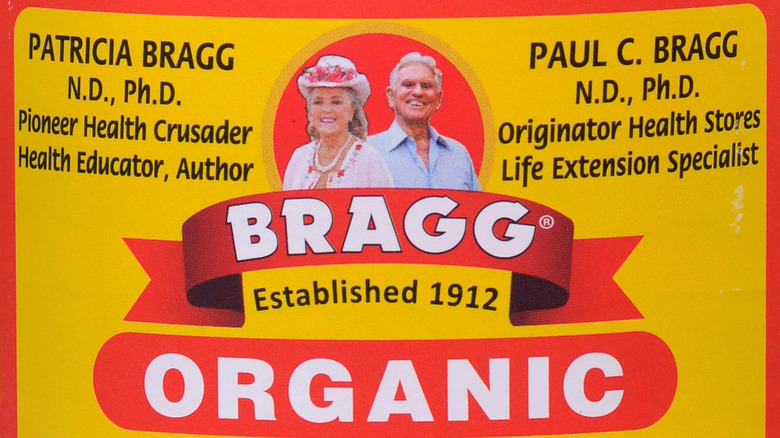Apple Cider Vinegar's Popularity Began With A Hollywood Health Guru
We may receive a commission on purchases made from links.
We Americans love a quick fix, and that may be why "superfoods" have become such a hot topic of late. Some of the most common so-called superfoods include spinach, blueberries, yogurt, and fish, but whenever a product claims to have miraculous benefits, you should eye them with a healthy bit of skepticism. The American Council of Science and Health (ACSH) acknowledges that many foods touted as "super" do indeed have health benefits, but the issue comes in thinking that any one food can provide perks like no other. For instance, the ACSH confirms that spinach contains nitrates that are beneficial to muscle growth, but so do grains, beets, and many other vegetables. In their words, "there are a nearly infinite combination of foods that you can eat to satisfy your body's dietary requirements." Don't get hung up on one.
Nevertheless, the concept of superfoods persists, and one of the most popular examples in recent memory is apple cider vinegar, or ACV. Its rise to prominence has been aided by A-list endorsements, with Us Weekly listing Katy Perry, Scarlett Johansson, and Kourtney and Kim Kardashian among its biggest proponents. Fans of ACV make a wide range of claims, saying it can soothe a sore throat, stop dandruff, and aid weight loss. You've probably heard some of these claims yourself, but if you think that apple cider vinegar is a recent trend, think again. ACV's tale of Hollywood success actually began a century ago.
Paul Bragg's gospel of ACV
The notion that vinegar can benefit one's health is quite ancient. Quartz reveals that soldiers of the Roman Empire drank a mixture of water and wine vinegar called posca, believed to be a source of vitality. The preference for apple cider vinegar, however, didn't arise until the 20th century. An early proponent was D.C. Jarvis, a Vermont-based doctor whose 1959 book, "Folk Medicine," encouraged routine vinegar consumption. However, Epicurious gives most of the credit for the modern ACV trend to Paul C. Bragg, who gained fame as a Hollywood health guru in the mid-1900s. You've probably seen Bragg's Apple Cider Vinegar in the grocery store, its label proudly exclaiming that it comes unfiltered, that is, with the "mother," a collection of yeast and bacteria resulting from fermentation (via MasterClass).
Bragg's website recounts its founder's story, beginning in 1912 when Paul opened Bragg's Health Food Store, which the brand claims to be the "first health food store in the United States." This claim is contested by Martindale's Natural Market in Springfield, Pennsylvania, which opened in 1869. Bragg expanded his business in the 1920s, opening a combination store and restaurant called the Bragg Health Center in Los Angeles (via Bon Appétit). The company was eventually passed to his daughter-in-law, Patricia, who spearheaded further expansion. The recent boost Katy Perry gave the business can be attributed to her friendship with Patricia. The singer grew up in Santa Barbara near Patricia's farm (via the Santa Barbara Independent).
How honest was Paul Bragg?
Paul Bragg popularized many of the claims we currently hear about apple cider vinegar. Epicurious notes that his booklet entitled, "The Apple Cider Vinegar Miracle Health System" promotes ACV as a virtual cure-all, helping with weight loss, heart disease, baldness, and a vague problem called "female troubles." According to Harvard Medical School, studies have indicated that ACV does have certain health benefits. Notably, it has been shown to help with blood sugar among diabetics by "blocking starch absorption." As far as weight loss goes, some studies showed that vinegar can improve metabolism and curb fat deposition, but the general consensus in the scientific community is that more research is needed.
Paul Bragg, however, wasn't willing to wait for scientific studies to back his beliefs, and his willingness to make bold claims without evidence landed him in trouble on multiple occasions. In the 1960s, he was cited by the Food and Drug Administration for "false and misleading claims to provide freedom from disease, improve youthful appearance, and life expectancy, etc." Claims that apple cider vinegar could preserve one's youth was perhaps Bragg's most popular and controversial claim, and he was known to lie about his age in interviews to promote this theory. Epicurious cites a 1972 advertisement that showed Bragg flexing in a swimsuit with the caption, "He is 91 years young." Bragg was born in 1895, making him 77 at the time that ad ran. Four years later, he died of a heart attack.


